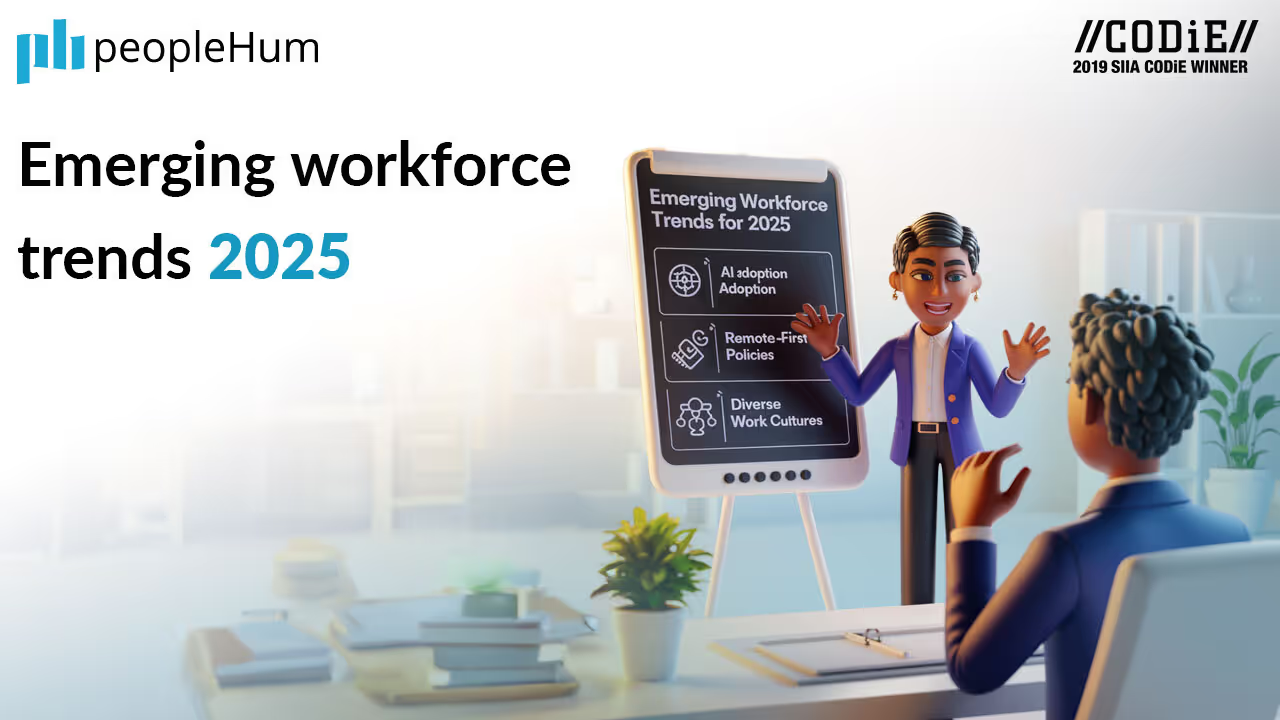The Workforce Is Evolving—Are You Ready?
2025 is already shaping up to be a transformative year for the workplace. Technological acceleration, shifting employee expectations, and socio-economic changes are reshaping how we attract, retain, and empower talent. For HR leaders, keeping up is no longer enough—it’s about staying ahead.
From AI-powered hiring to the rise of purpose-led cultures, the landscape of work is changing in ways that demand thoughtful strategy and fast action. This guide explores the top 10 emerging workforce trends of 2025 that every HR professional needs on their radar—complete with insights, use cases, and action points.
1. Rise of Hybrid-First Workforces
Hybrid isn’t going away—it’s evolving. In 2025, hybrid-first models are being built into the DNA of organizations rather than being seen as a temporary response.
According to Gartner, 39% of knowledge workers worldwide are now hybrid—and that number is expected to rise.
What HR Can Do:
- Use platforms like the employee management system from peopleHum to support distributed teams.
- Rethink benefits to include work-from-anywhere stipends or mental health apps.
- Build policies that foster flexibility, trust, and accountability.
2. AI-Powered Recruitment and Workforce Planning
The rise of generative AI is making HR smarter—and faster. Talent acquisition is being redefined with predictive analytics, chatbot screening, and resume parsing.
LinkedIn’s Future of Recruiting Report notes that 74% of hiring professionals expect AI to play a major role in the next five years.
What HR Can Do:
- Implement AI-powered recruitment software like peopleHum to streamline hiring.
- Monitor for algorithmic bias and uphold transparency in hiring practices.
- Use AI insights to forecast talent needs and workforce gaps.
3. Focus on Skills Over Degrees
Credentials are being replaced by capabilities. Companies are ditching rigid job descriptions in favor of skills-based hiring strategies.
IBM, Google, and Accenture have all removed degree requirements from several job roles (Harvard Business Review).
What HR Can Do:
- Track internal competencies using skills mapping tools.
- Promote employees based on outcomes, not educational pedigree.
- Launch reskilling programs in partnership with L&D.
- Explore how to map skills in your organization to support skills-based development and promotion.
4. Employee Experience as a Business Metric
HR leaders are doubling down on employee experience (EX) to reduce turnover and boost engagement.
A report by Qualtrics shows that companies with highly engaged employees outperform their peers by 147% in earnings per share.
What HR Can Do:
- Use peopleHum’s employee engagement platform to track morale in real-time.
- Personalize the employee journey—from preboarding to exit interviews.
- Replace annual reviews with frequent check-ins and sentiment tracking.
5. Mental Health Support Goes Mainstream
Burnout is now treated as a systemic issue, not just an individual one. Mental wellness is a top priority in the HR playbook for 2025.
According to Deloitte, 46% of Gen Z and 39% of Millennials feel anxious or stressed all the time.
What HR Can Do:
- Introduce flexible work hours and mental health days.
- Train managers to recognize signs of distress.
- Offer digital well-being solutions integrated within peopleHum’s platform.
- Embed well-being tools directly into your HRMS software to offer always-on support.
6. Purpose-Driven Work and Social Impact Expectations
Today’s employees want more than a paycheck—they want meaning. Organizations with a clear purpose are more attractive to top talent.
PwC’s Workforce Hopes and Fears Survey revealed that 75% of workers want their work to make a difference in society.
What HR Can Do:
- Align your culture with your mission—and embed it into daily operations.
- Showcase your sustainability and diversity commitments in recruitment materials.
- Make purpose part of performance reviews and recognition systems.
7. Multi-Generational Workforce Management
From Baby Boomers to Gen Z, the modern workforce spans four generations, each with unique expectations and values.
Pew Research notes the widening value and communication gaps between generational groups.
What HR Can Do:
- Offer customized learning paths based on experience and digital fluency.
- Encourage reverse mentorship programs and knowledge sharing.
- Leverage a performance management system that adapts feedback and goal-setting styles across generations.
8. Freelance, Contract, and On-Demand Talent Boom
The gig economy isn’t slowing down. Freelancers now account for over 50% of the U.S. workforce according to Statista.
What HR Can Do:
- Build hybrid workforce models that combine full-time and freelance talent.
- Create engagement frameworks for contractors—just like regular employees.
- Use HRMS software that allows easy onboarding and tracking of freelance or contract employees.
9. Data-Driven Diversity, Equity, and Inclusion (DEI)
DEI is evolving from intention to measurement. In 2025, HR teams are using real-time dashboards and analytics to monitor impact.
A McKinsey report showed that companies with high ethnic diversity outperform their peers by 36% in profitability.
What HR Can Do:
- Integrate DEI metrics into OKRs and business scorecards.
- Conduct regular pay equity and representation audits.
- Leverage people analytics to drive data-informed DEI initiatives.
10. Cybersecurity and Employee Data Privacy
The digitization of HR means increased responsibility in data protection. With remote work and AI tools on the rise, safeguarding employee data is non-negotiable.
The World Economic Forum ranks cyber threats among the top global risks in the next decade.
What HR Can Do:
- Use secure HR systems with GDPR, SOC2, and ISO certifications.
- Partner with IT to conduct regular cybersecurity audits.
- Educate staff on digital hygiene, especially while working remotely.
Final Thoughts: Future-Ready HR Starts Now
The workforce of 2025 demands HR leaders who are not only responsive—but proactive. From leveraging AI and managing hybrid teams to fostering psychological safety and data security, the role of HR is at the center of business transformation.
The good news? You don’t have to navigate it alone.
With peopleHum, you can simplify HR processes, empower employees, and stay ahead of every workforce trend. Book a free demo today to see how.















































